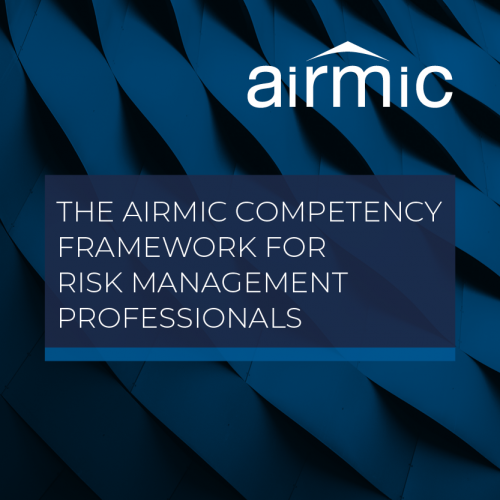Airmic competency framework
Foreword
DOWNLOAD THE FULL GUIDE PDF HERE
Disruption is the new normal and no industry is exempt from change. Life is more complex, connected, challenging, faster – and exciting! Although technology will facilitate change, people will take the decisions that drive change. This context creates new risks and new opportunities and demands a shift in emphasis for the risk professional, who must closely engage with the purpose of their organisation to support and contribute to the organisation’s direction.
- Risk professionals must be better aligned with business priorities. They must demonstrate strong business and commercial acumen and engage more intensely with the organisation’s purpose, strategy, major objectives and investments. This will sharpen their ability to develop valuable insights into emerging risk concerns and help them develop innovative risk mitigation solutions.
- Risk professionals must be professionally fit for the future. They must develop analytical skills and methodologies using new data science and automation techniques. Coupled with a good grasp of emerging technologies, this should free risk professionals up for higher level (as opposed to routine) risk work and enable them to engage and act as trusted advisors to business leaders and functional peers.
- Risk professionals must be more dynamic in stakeholder engagement. A more creative and collaborative approach to managing risks and opportunities will enable them to recognise and address institutional and individual biases, discover blind spots, and surface emerging risks and opportunities for which evidence may be limited or conflicting.
Risk professionals must consider and synchronise to the extent possible the different speeds at which strategic, tactical and operational risks develop. The job of the risk professional is to challenge the status quo and to make sure the typically faster pace of external developments is synchronised with those internal to the organisation, and that these move smoothly in the same direction.
When consulted in August 2020, Airmic members rated different knowledge and skills, coupled with an increase in authority and more flexible working, as the greatest changes to their jobs over the last four years. Digital literacy, a creative mindset and negotiating and influencing were considered the most important skills for the future. The technical aspects of the risk professional’s role are being stretched into areas requiring influencing skills, business awareness and technology fluency. Those who can combine these will be best positioned to support their organisation in today’s dynamic environment and achieve personal professional success. In the words of Airmic CEO John Ludlow, “the risk professional who understands the risk context and business will become a business partner”.
The purpose of this Competency Framework is to provide risk professionals with a [tool/process] to help them navigate their career and to demonstrate they are not travelling this journey alone – Airmic is there to provide support. We hope you find the Competency Framework helpful.
Julia Graham
Deputy CEO and Technical Director, Airmic
- Fill out an application Our membership manager will assess your eligibility against our criteria.
- Complete your profileIf you are eligible for membership you will be asked to answer a few questions about yourself.
- PaymentYou can make payment online using a card or request an invoice.

